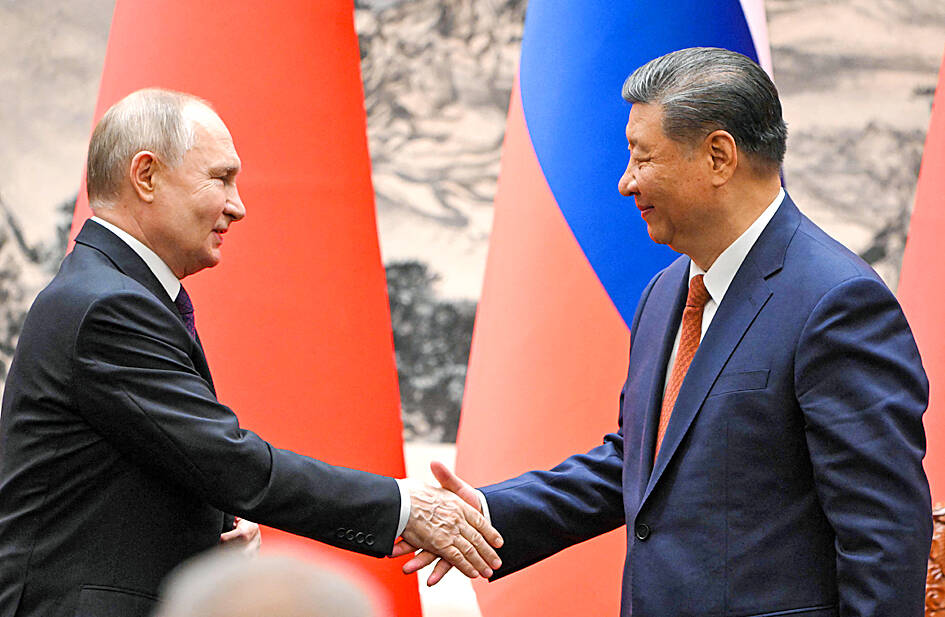Chinese President Xi Jinping (習近平) and Russian President Vladimir Putin yesterday framed their nations’ ties as a stabilizing force in a chaotic world as they met in Beijing.
Putin was greeted by Xi at a grand welcoming ceremony outside Beijing’s Great Hall of the People, footage by state broadcaster CCTV showed.
In a meeting, Xi then told his “old friend” Putin that China-Russia relations were “conducive to peace.”

Photo: AFP
“China is ready to work with Russia to ... uphold fairness and justice in the world,” Xi added.
Putin, in turn, told Xi that the two countries’ relations were “stabilizing factors in the international arena.”
“Relations between Russia and China are not opportunistic and not directed against anyone,” Putin said, a Kremlin readout showed. “Together, we uphold the principles of justice and a democratic world order that reflects multipolar realities and is based on international law.”
Following closed-door meetings, the two leaders signed a joint statement on deepening their countries’ “comprehensive strategic partnership,” Xinhua news agency reported.
The Russian leader’s arrival came hours after he hailed his country’s troops for advancing on “all fronts” on the battlefield in Ukraine, following a major new ground assault.
The Kremlin said that Russia and China had agreed to oppose “further escalation” of the conflict in Ukraine.
“The parties note the need to stop any steps that contribute to the prolongation of hostilities,” the Kremlin’s readout of their joint statement said.
In a statement to media following talks with Putin, Xi said the two sides agreed on the need for a “political solution” to resolve the war.
“China’s position on this issue has always been clear,” Xi said in footage broadcast by Russian TV.
That position included “respecting the sovereignty and territorial integrity of all countries” as well as “respecting the reasonable security concerns of all sides,” he added.
The remarks echo a paper issued by Beijing last year, which Western countries said could enable Russia to hold much of the territory it has seized in Ukraine.

A magnitude 7.0 earthquake struck off Yilan at 11:05pm yesterday, the Central Weather Administration (CWA) said. The epicenter was located at sea, about 32.3km east of Yilan County Hall, at a depth of 72.8km, CWA data showed There were no immediate reports of damage. The intensity of the quake, which gauges the actual effect of a seismic event, measured 4 in Yilan County area on Taiwan’s seven-tier intensity scale, the data showed. It measured 4 in other parts of eastern, northern and central Taiwan as well as Tainan, and 3 in Kaohsiung and Pingtung County, and 2 in Lienchiang and Penghu counties and 1

A car bomb killed a senior Russian general in southern Moscow yesterday morning, the latest high-profile army figure to be blown up in a blast that came just hours after Russian and Ukrainian delegates held separate talks in Miami on a plan to end the war. Kyiv has not commented on the incident, but Russian investigators said they were probing whether the blast was “linked” to “Ukrainian special forces.” The attack was similar to other assassinations of generals and pro-war figures that have either been claimed, or are widely believed to have been orchestrated, by Ukraine. Russian Lieutenant General Fanil Sarvarov, 56, head

FOREIGN INTERFERENCE: Beijing would likely intensify public opinion warfare in next year’s local elections to prevent Lai from getting re-elected, the ‘Yomiuri Shimbun’ said Internal documents from a Chinese artificial intelligence (AI) company indicated that China has been using the technology to intervene in foreign elections, including propaganda targeting Taiwan’s local elections next year and presidential elections in 2028, a Japanese newspaper reported yesterday. The Institute of National Security of Vanderbilt University obtained nearly 400 pages of documents from GoLaxy, a company with ties to the Chinese government, and found evidence that it had apparently deployed sophisticated, AI-driven propaganda campaigns in Hong Kong and Taiwan to shape public opinion, the Yomiuri Shimbun reported. GoLaxy provides insights, situation analysis and public opinion-shaping technology by conducting network surveillance

‘POLITICAL GAME’: DPP lawmakers said the motion would not meet the legislative threshold needed, and accused the KMT and the TPP of trivializing the Constitution The Legislative Yuan yesterday approved a motion to initiate impeachment proceedings against President William Lai (賴清德), saying he had undermined Taiwan’s constitutional order and democracy. The motion was approved 61-50 by lawmakers from the main opposition Chinese Nationalist Party (KMT) and the smaller Taiwan People’s Party (TPP), who together hold a legislative majority. Under the motion, a roll call vote for impeachment would be held on May 19 next year, after various hearings are held and Lai is given the chance to defend himself. The move came after Lai on Monday last week did not promulgate an amendment passed by the legislature that